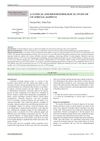 August 2021 in “Research Square (Research Square)”
August 2021 in “Research Square (Research Square)” Borneol Essential Oil could be a natural and safe acne treatment.
 10 citations,
October 2015 in “Medicina Clínica (english Edition)”
10 citations,
October 2015 in “Medicina Clínica (english Edition)” Recombinant human epidermal growth factor is versatile, effective, and safe for long-term skin and mucosal treatments.
 15 citations,
May 2011 in “Veterinary Dermatology”
15 citations,
May 2011 in “Veterinary Dermatology” Vitamin A might be a safe extra treatment for dogs with sebaceous adenitis, but more research is needed to prove its effectiveness.
 83 citations,
June 2018 in “Frontiers in immunology”
83 citations,
June 2018 in “Frontiers in immunology” Certain types of T cells are essential for healthy skin and play a role in skin diseases, but more research is needed to improve treatments.
 5 citations,
July 2013 in “Our Dermatology Online”
5 citations,
July 2013 in “Our Dermatology Online” Lichen planopilaris is the most common type of scarring hair loss observed, with a variety of symptoms and tissue changes.
 25 citations,
October 2018 in “Journal of The American Academy of Dermatology”
25 citations,
October 2018 in “Journal of The American Academy of Dermatology” Erosive pustular dermatosis of the scalp is a type of skin inflammation often confused with other conditions, requiring continuous treatment.
 4 citations,
January 2015 in “Türk Patoloji Dergisi”
4 citations,
January 2015 in “Türk Patoloji Dergisi” Hormone imbalances from endocrine diseases can cause various skin conditions that help diagnose and treat these diseases early.
 May 2024 in “International Journal of Nanomedicine”
May 2024 in “International Journal of Nanomedicine” Biodegradable polymers can improve cannabinoid delivery but need more clinical trials.
 96 citations,
January 1997 in “Clinics in Dermatology”
96 citations,
January 1997 in “Clinics in Dermatology” Pregnancy can cause skin pigmentation, stretch marks, and changes in hair, nails, and sweat glands, with most resolving after birth.
 142 citations,
March 2019 in “Frontiers in Cellular Neuroscience”
142 citations,
March 2019 in “Frontiers in Cellular Neuroscience” The document concludes that adenosine receptor agonists have potential for treating various conditions, but only a few are approved due to challenges like side effects and the need for selective activation.
15 citations,
February 2021 in “Frontiers in immunology” Leptin, a hormone from fat cells, affects immune responses and can influence skin diseases and hair growth.
 July 2022 in “Biomedicines”
July 2022 in “Biomedicines” 4-Aminopyridine improves skin wound healing and tissue regeneration by increasing cell growth and promoting nerve repair.
5 citations,
March 2016 in “Experimental and molecular pathology” Mice with alopecia areata had wider lymphatic vessels in their skin.
 143 citations,
September 2008 in “Experimental gerontology”
143 citations,
September 2008 in “Experimental gerontology” Skin aging is due to impaired stem cell mobilization or fewer responsive stem cells.
 24 citations,
January 2012 in “Journal of Cellular Biochemistry”
24 citations,
January 2012 in “Journal of Cellular Biochemistry” C-reactive protein helps monocytes stick to blood vessel cells by causing oxidative stress.
6 citations,
March 2018 in “Proceedings - Baylor University. Medical Center” Sarcoidosis can cause severe high calcium levels, hair loss, and kidney failure.
 2 citations,
May 2018 in “Expert opinion on orphan drugs”
2 citations,
May 2018 in “Expert opinion on orphan drugs” Newborn screening and gene therapy are expected to improve outcomes for Omenn syndrome patients.
8 citations,
June 2023 in “Journal of clinical medicine” Nanofat shows promise for facial rejuvenation and treating skin issues but needs more research for long-term safety.
 318 citations,
January 2022 in “Signal Transduction and Targeted Therapy”
318 citations,
January 2022 in “Signal Transduction and Targeted Therapy” The Wnt/β-catenin pathway is important for body functions and diseases, and targeting it may treat conditions like cancer, but with safety challenges.
 8 citations,
November 2013 in “PLOS ONE”
8 citations,
November 2013 in “PLOS ONE” Cells with active Wnt signaling are less likely to turn into cancer when exposed to a cancer-causing gene.
44 citations,
August 2014 in “Anais brasileiros de dermatologia/Anais Brasileiros de Dermatologia” Methotrexate is a promising and safe treatment for severe alopecia areata, with better results when combined with corticosteroids.
91 citations,
January 2010 in “Journal of Allergy and Clinical Immunology” NK cells play a role in skin diseases like eczema and psoriasis.
 8 citations,
October 2020 in “Lasers in Medical Science”
8 citations,
October 2020 in “Lasers in Medical Science” LLLT helps treat hair loss by increasing blood flow, reducing inflammation, and stimulating growth factors.
 16 citations,
September 2018 in “Journal of Ethnopharmacology”
16 citations,
September 2018 in “Journal of Ethnopharmacology” Plant-based remedies may treat hair loss by reducing inflammation and improving insulin resistance.
 16 citations,
March 2018 in “Seminars in Oncology”
16 citations,
March 2018 in “Seminars in Oncology” The document concludes that pregnancy and cancer share immune evasion tactics, but more research is needed before using checkpoint blockade immunotherapy in pregnant cancer patients to avoid harm to the placenta.
 10 citations,
January 2018 in “Elsevier eBooks”
10 citations,
January 2018 in “Elsevier eBooks” Burn scars heal abnormally and more research is needed to find better treatments.
 39 citations,
July 2008 in “Dermatologic Therapy”
39 citations,
July 2008 in “Dermatologic Therapy” Pseudopelade of Brocq is a unique hair loss condition, but its cause and development are still not fully understood.
 March 2022 in “Benha Journal of Applied Sciences”
March 2022 in “Benha Journal of Applied Sciences” ULBP3 levels are higher in Tinea capitis patients and may help predict the disease's severity.
 120 citations,
October 2007 in “Clinical Interventions in Aging”
120 citations,
October 2007 in “Clinical Interventions in Aging” Estrogens help reduce skin aging, and SERMs might offer similar benefits without the risks of hormone therapy.
3 citations,
August 2022 in “International Journal of Molecular Sciences” COVID-19 can cause hair loss, and treatments like PRP and stem cells might help.























